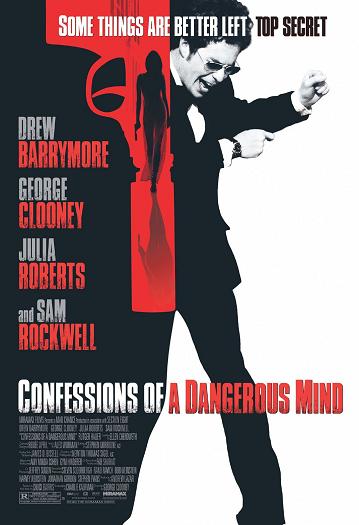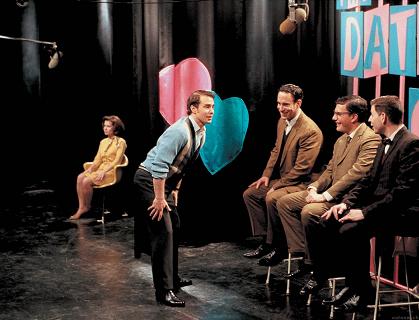Confessions of a Dangerous Mind, a screen version of Chuck Barris' Autobiography
NOWADAYS WHEN people turn on the television, they don’t expect to see only celebrities. Recently, various reality shows featuring ordinary participants have become huge hits in Korea, continuing a phenomenon that started in the United States. Chuck Barris, the very person who gave wide popularity to these modern reality shows in the United States, has put out his own spectacular, show-like life story. The film Confessions of a Dangerous Mind, a screen adaptation of the story, presents the mysterious, self-written tale of Barris with thrills and humor.

An autobiography on screen
Chuck Barris is best known as a '70s American television producer and host. He came up with various game shows that became remarkable hits, including “The Gong Show,” “The Dating Game,” and “The Newlywed Game.” In 1984, he published an autobiography titled Confessions of a Dangerous Mind: An Unauthorized Autobiography, which was turned into a film directed by George Clooney in 2002. The movie follows the structure and contents of the book quite closely, exhibiting the features of an autobiography by having Barris, performed by Sam Rockwell, tell the story in his own voice. Following his narration, the story is acted out in chronological order, with interviews of Barris’ acquaintances from time to time, thus giving the viewers the chance to hear about him from a different perspective.
The story is all based on Barris’ memoir, but is not substantiated. Recall the title of the original book, Confessions of a Dangerous Mind: An Unauthorized Autobiography. An unauthorized biography refers to a biography not approved by its subject. Ironically, Barris calls his own biography “unauthorized,” leaving it up to the readers whether to believe the contents or not. Reflecting this intention, the filmmaker does not try at all to provide an answer to questions over the veracity of the story. Instead, he inserts interview clips of Barris’ former co-workers testifying about what kind of person Barris was, arousing even more questions for the viewers. Jim Lange, the host of “The Dating Game,” testifies that Barris used to disappear without saying where he was going, and Jaye P. Morgan, a Gong Show regular, claims to know a lot about him that people would not want to know.
New ideas for TV
With a competition format featuring ordinary people as contestants, Barris’ reality game shows were considered quite revolutionary for the time. The film shows how he came to create such programs. Barris envisioned that the participants would be more than willing to sacrifice their privacy and dignity on national television in exchange for the prizes and a brief moment of fame.
Lange remarks in an interview, “Barris had a great feel of what people wanted to watch.” “The Gong show,” his biggest success, was a talent contest geared towards humor. The show actually focused on the particularly bad contestants, not the good ones. If the performance reached a point that was unbearable, the judges struck a large gong to kill the performance. This show attracted numerous viewers who enjoyed watching just how absurd some people are and laughing at their embarrassment and anger when gonged. This mentality and behavior are also reflected in the attitudes of modern viewers. Take recent reality programs in a contest format such as “American Idol” in the United States and “Superstar K” in Korea. Although these programs aim to find talented singers, many viewers find more amusement in the first few episodes, in which bad or simply weird ones are humiliated in front of the judges.
Barris led his shows to success with his common touch and brilliant eye for reading the desires of the contestants and the viewers, but he and his shows cannot avoid moral criticism. He ridicules the contestants on his own shows, saying there are so many Americans just waiting for the opportunity to get on TV and make a fool out of themselves. Yet, at the same time, he is using such an inclination as a tool for his personal success. The people on the show are human beings and deserve respect. They are just craving a little attention, and using this as a source of entertainment is quite shameful on his part. He says his intention is to bring joy to people in difficult times, but that is clearly not how the world often sees him. Some harsh critics in the film even insist that Barris represents the decline of modern civilization.

Lost in a double life
People only remember Barris as a TV producer, but believe it or not, Barris claims he secretly worked for the Central Intelligence Agency (CIA), receiving government orders to kill people. Interestingly, the film presents Barris’ two completely different yet parallel lives ? one as a pioneering TV producer and another as a cold-blooded killer ? in separate story lines until he himself starts to have difficulties separating the two in his head. Such a presentation allows the viewers to see the world around him from his point of view. As the show-like double life continues, Barris finds himself extremely vulnerable and isolated. Terrified of everything and ashamed of his life, he begins to have delusions and suffers from paranoia, which makes it hard for him to function normally in ordinary life. Joyful moments full of laughter and bloody murder scenes, each representing completely different states of mind, are presented like panoramas. The screen then shows a close-up shot of Barris’ dazed face with tears on it, reflecting the difficulty and confusion he feels.
Barris cannot settle down in a romantic relationship either. He sustains a long-term relationship with a loving and devoted girlfriend, Penny, but keeps having affairs with other women. He knows he loves Penny in his own way, but the memories of his parents’ unhappy marriage, in addition to his already unstable mental state, make it difficult for him to believe in love and to give commitment. Considering romantic love as just an illusion, he constantly turns his back on Penny and hurts her, which in turn hurts him as well. Barris’ attitude shows how past scars and insecurity about oneself may influence an individual to fear forming a truthful relationship with others.
* * *
Towards the end, Barris shares his idea for a new game show, "The Old Game". As participants, three old guys are to look back on their life with a loaded gun in their hand. The winner, the one who does not blow his brains out, receives a refrigerator. This terrible and pathetic scenario for the show seems to reflect Barris’ deep and painful regrets about the way he has lived his own life. Whether the content is really authentic or not, the film Confessions of a Dangerous Mind vividly depicts a man’s scarcely believable life story in the form of self-reflection, in a regretful voice that is yet not without a sense of humor.
Title: Confessions of a Dangerous Mind
Genre: Movie (Biography, Black Comedy, Crime, Romance)
Release Date: Jan. 24, 2003 (United States)
Runtime: 113 min.
*Video with Korean subtitles available at the Multimedia Center, Yonsei-Samsung Library.
Related work
Book Confessions of a Dangerous Mind: An Unauthorized Autobiography by Chuck Barris

